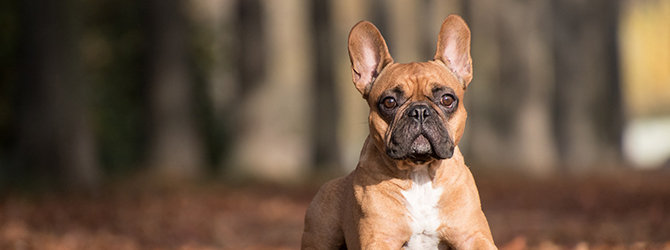The French Bulldog: thinking of getting a French Bulldog?
French Bulldogs are happy, curious and affectionate little dogs. They’re ideal for city or urban life and are often great companions for small children.
Let’s take a closer look at the French Bulldog – their exercise needs, training requirements and general temperament.
Place of origin: England, taken to France during the time of the industrial revolution
How big are French Bulldogs? 27 – 30cm
How heavy are French Bulldogs? 7 – 12kg
Life Expectancy: 11 - 14 years
Colour: Brindle, Fawn, White, Tan, Brindle & White
Please note: A dog’s exercise, training/stimulation and grooming requirements can depend on several factors such as age and health. The same goes for ongoing costs of ownership. For advice on one specific dog, we always advise chatting with a vet.
How much exercise does a French Bulldog need?
As with most breeds, a Frenchie will need regular exercise to stay healthy and stimulated. They’ll need a walk every morning and afternoon.
Unlike other breeds however, French Bulldogs aren’t suitable for intense exercise. Their flat faces mean that their airways are often restricted, making them susceptible to breathing problems and overheating, especially in hot weather.
Read more: Breathing problems in Brachycephalic breeds.
If you live in a city or and are looking for a dog that will be content with brisk walks through well-populated areas, a French Bulldog may be a good fit. If you’re a keen adventurer and want a dog to accompany you on long hikes, runs or bike rides, you’d be more suited to a different breed.
Training: how to train a French Bulldog
French Bulldogs are intelligent dogs that enjoy pleasing their owners… but their temperament means they can be easily distracted. Keep their training sessions short and different each time, begin when the Frenchie is young and always use positive reinforcement.
Frenchies typically take longer than the average dog to become housetrained but with persistence and plenty of reward-based training, there’s no reason your Frenchie can’t become perfectly well trained… just don’t be surprised if they have the occasional accident!

Grooming: do French Bulldogs shed?
Frenchies are relatively low maintenance when it comes to grooming. Their smooth coats should only need one thorough brush per week and you’ll only need to bathe your French Bulldog when they’re really dirty.
One thing to bear in mind with a Frenchie is the folds of skin around their mouth. These are at risk of infection, which can cause many health problems. To avoid infection, clean around their mouth regularly and make sure it stays as dry as possible.
Complete your French Bulldog’s grooming routine with regular tooth brushing, nail clips and ear checks.
French Bulldog temperament, socialising and ideal home environment
French Bulldogs are sociable beings. They thrive in the company of their owners and can never get too much attention. Their temperament makes them great companions for families with young children but perhaps not the best match for single people or those who leave their house unattended for long hours at a time. Frenchies are laid back too – as long as they’re walked, they don’t mind whether it’s in a vast open area or around the block – making them great pets for those who live in cities or flats/apartments.
Note once again that Frenchies aren’t suitable for intense or prolonged exercise.
Cost of French Bulldog ownership
When you’re considering the lifetime cost of owning a Frenchie, remember to take into account:
- Breed-specific food
- Veterinary care
- Pet insurance
- Kennels or dog sitters
- Grooming costs
- Toys and equipment
- Preventative healthcare
As a rough guide, allow between £80 and £90 a month to cover the ongoing costs of owning a French Bulldog. Our vets have drawn up this handy guide to save dog owners money.
As brachycephalic dogs, French Bulldogs are on average more susceptible to a range of health problems than other breeds. In particular, they may require surgery to open up their airways and improve their breathing. For more information on brachycephalic breeds, contact your vet.
Need more info?
For more info on finding the best dog breed for you and your lifestyle, have a chat with your vet.
Find your nearest vet using our Find a Vet page, or speak to a vet online using Online Vets.

